Story Highlights
- Men and women differ on morality of sex
- Biggest gender gap on pornography
- Women more likely to accept children born out of wedlock
WASHINGTON, D.C. -- Americans are finding more behaviors or social issues "morally acceptable" than they have in the past, but men and women still differ on several issues, notably those related to sex and relationships. Pornography is the most divisive, with 43% of men finding it morally acceptable versus 25% of women. Notable gender gaps also exist in how men and women view divorce, having a child out of wedlock, polygamy and extramarital affairs.
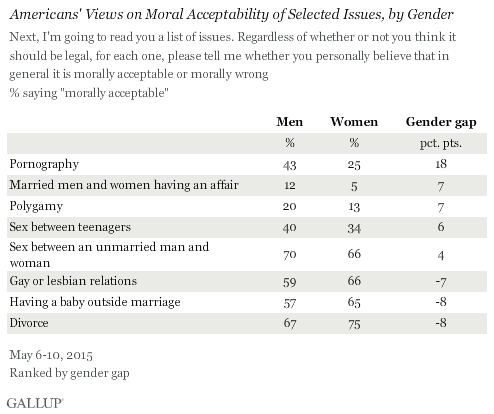
These findings come from Gallup's May 6-10 Values and Beliefs survey, which is the latest update of a poll that has documented the changing social mores of the country since the early 2000s. This year's survey found a general nationwide shift toward acceptance of once-controversial issues, and even small increases in behaviors widely regarded as morally taboo.
But even against the current of increasing social permissiveness, men and women still have notable disagreements on several issues related to sex, relationships and marriage. Pornography is the source of the largest discord between men and women. Consistently since 2011, men have been about twice as likely as women to say pornography is "morally acceptable." Nonetheless a clear consensus exists among both genders on this issue, with regular majorities of men and women saying pornography is "morally wrong."
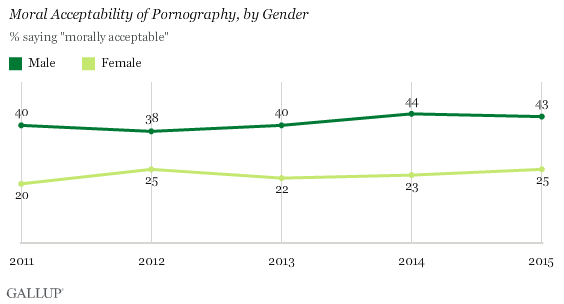
Men and women also view two issues that conflict with traditional societal "ideals" of a committed monogamous relationship -- adultery and polygamy -- differently, although, in both cases, only small percentages of each find them acceptable. Men are seven percentage points more likely to say polygamy or having an affair is morally acceptable. Interestingly, while men regularly have been more likely than women to say polygamy is morally acceptable over the years, attitudes on adultery have fluctuated over time. In 2001, there were no gender differences on this issue. The gap has widened and narrowed in the years since, but the overarching pattern shows men are slightly more likely to find adultery morally acceptable.
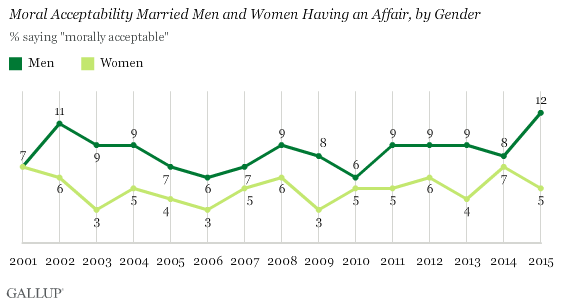
Women Now More Likely to View Having a Child Outside of Wedlock as Acceptable
Majorities of both genders now say having a baby outside of marriage is morally acceptable. At 65%, women are slightly more likely than men (57%) to say this. Women's views of the moral acceptability of having children out of wedlock have shifted 19 points since 2002, while the increase has been 14 points among men. Although more women than men this year say having a baby outside of marriage is morally acceptable, this has not always been the case in the past.
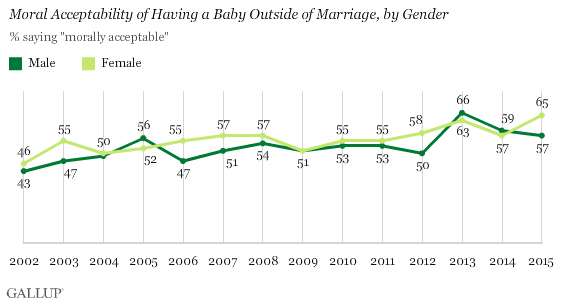
Also, the percentage of women finding divorce morally acceptable has climbed by nearly 20 points in that time. Today, three-fourths of women find divorce acceptable, which is higher than the percentage of men who do (67%). However, the gap on this issue has not been consistent: Men have been more accepting of divorce than women in some years, while in other years, there have been no significant differences between the genders.
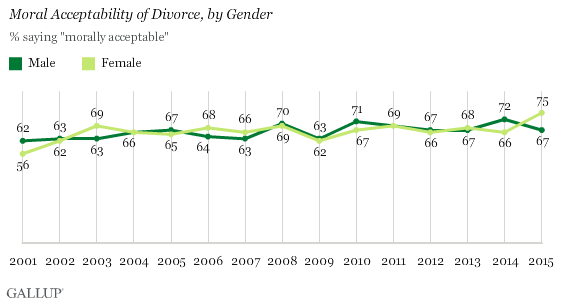
Bottom Line
Perhaps not surprisingly, men and women have different views on the moral acceptability of certain issues related to sex and relationships. Men are more likely to accept behaviors such as pornography or affairs. This year, women are more accepting of divorce or having a child without being married.
Nonetheless, the differences between men and women are mostly a matter of degree rather than of kind. Large majorities of men and women find divorce and having children outside of marriage as morally acceptable. Small majorities of both see engaging in affairs or polygamy in the same way. Though variations exist, for most men and women, the boundaries of what is morally acceptable behaviors in terms of behavior in the sometimes sensitive realm of sex and relationships are mostly the same for men and women.
Survey Methods
Results for this Gallup poll are based on telephone interviews conducted May 6-10, 2015, with a random sample of 1,024 adults, aged 18 and older, living in all 50 U.S. states and the District of Columbia. For results based on the total sample of national adults, the margin of sampling error is ±4 percentage points at the 95% confidence level. All reported margins of sampling error include computed design effects for weighting.
Each sample of national adults includes a minimum quota of 50% cellphone respondents and 50% landline respondents, with additional minimum quotas by time zone within region. Landline and cellular telephone numbers are selected using random-digit-dial methods.
Learn more about how Gallup Poll Social Series works.

